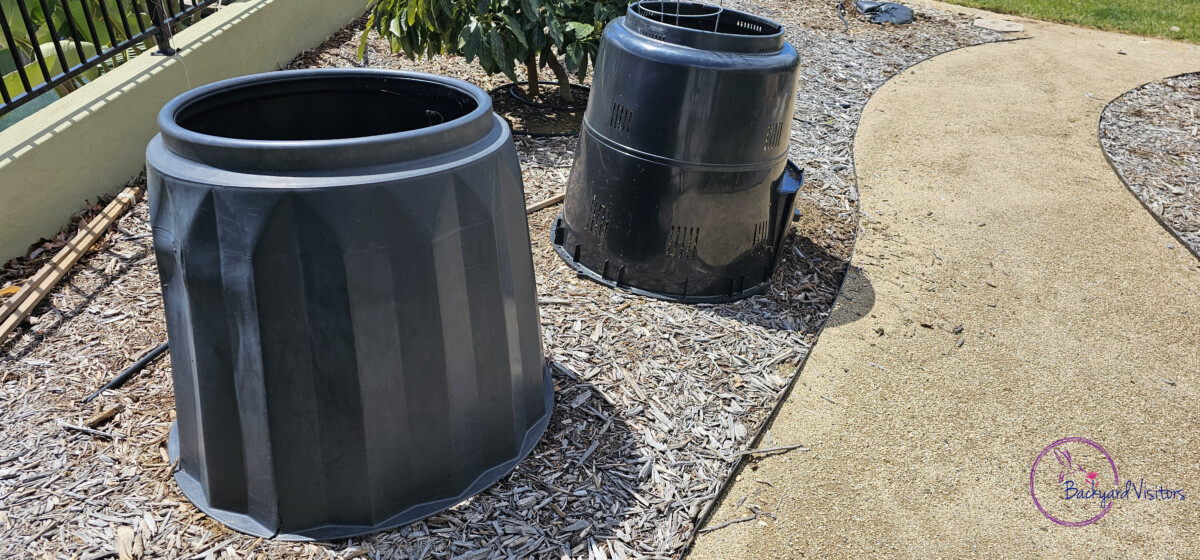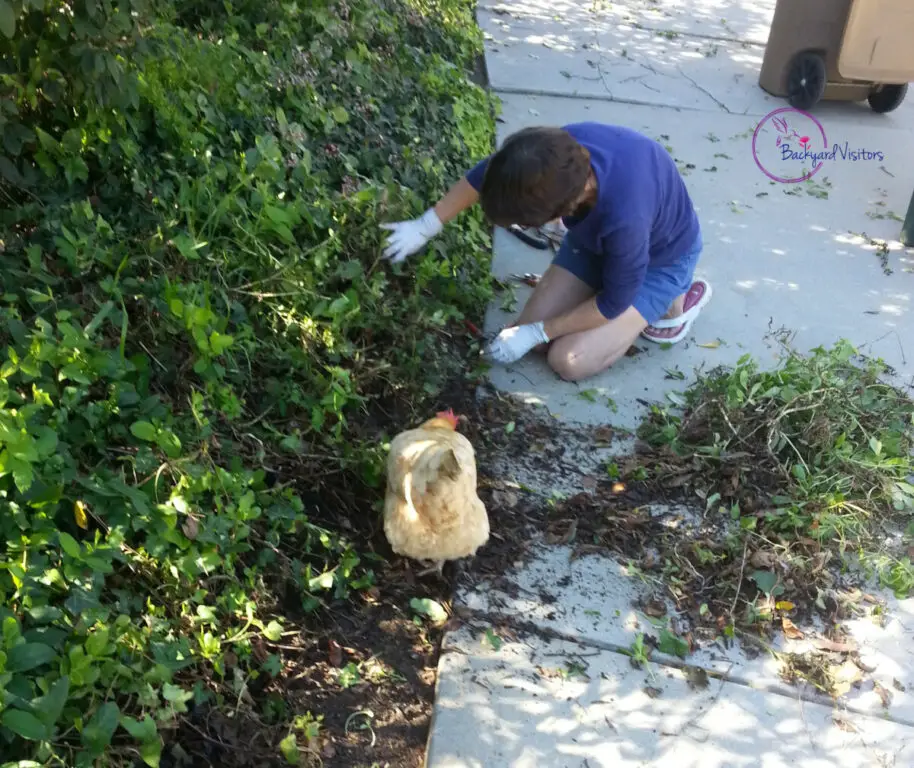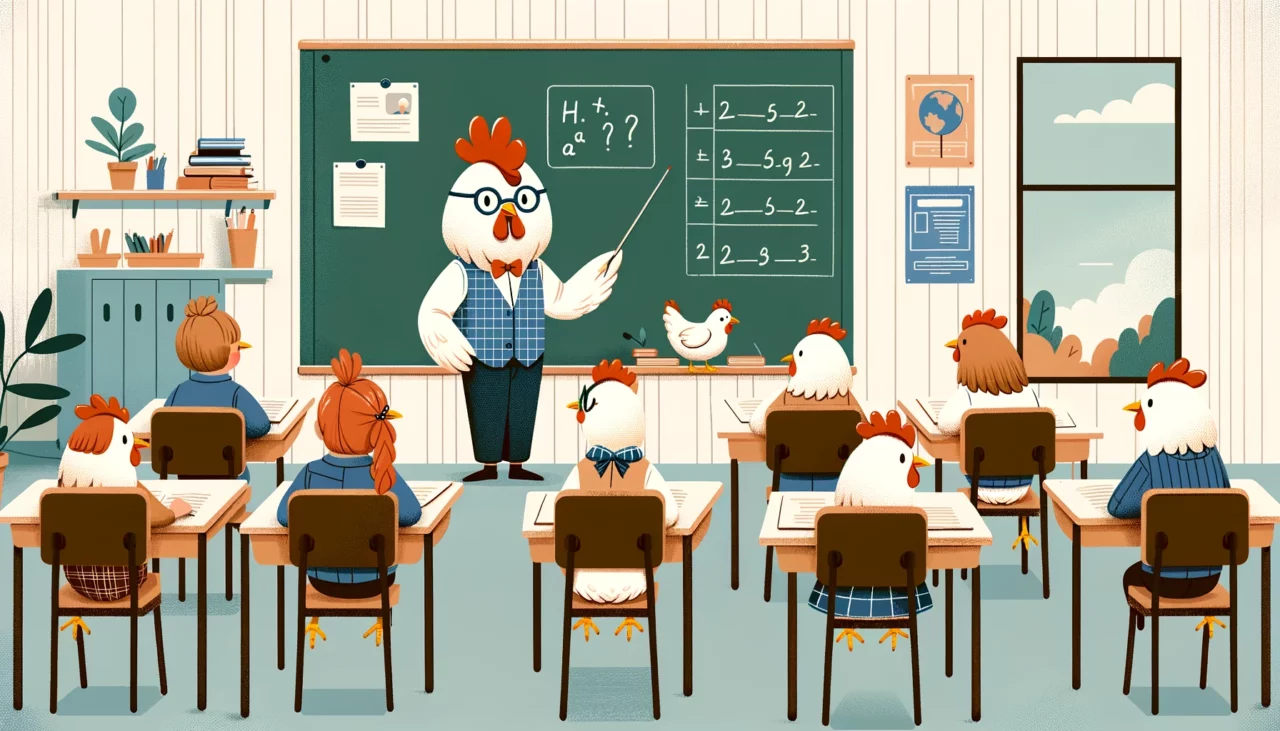This post contains affiliate links.
Teach children sustainability and nature through backyard chicken keeping. Discover the environmental benefits of raising chickens for children, fostering eco-friendly habits, and understanding natural cycles.
Teaching children about sustainability and nature has never been more engaging than through the practice of backyard chicken keeping. This hands-on activity offers young learners invaluable lessons on environmental stewardship, food production, and the natural lifecycle.
Chickens provide fresh eggs and reduce household waste and enhance our understanding of eco-friendly living. Dive into the world of chicken keeping to explore how this simple yet profound activity fosters an appreciation for nature and promotes sustainable living practices among children.
What are the benefits of keeping chickens at home?
Keeping chickens at home entails numerous benefits, particularly when educating children about sustainability, conservation, and the environment. Raising chickens offers children a hands-on approach to understanding the life cycle and the importance of sustainable practices.
When children observe their flock daily, they witness the birth of chicks and the growth of their backyard companions, fostering a deep connection to nature. This experience is likely to instill a natural curiosity and respect for the environment that will last a lifetime. Research suggests that early exposure to nature positively shapes children’s attitudes towards conservation.
A distinctive benefit of raising chickens is the responsibility it instills in children. By taking care of the flock, children learn about the cycle of life and the day-to-day tasks of maintenance. They will discover the importance of providing food and water, while also developing an understanding of the effort needed to keep these backyard animals safe and comfortable. This kind of active involvement nurtures a sense of stewardship and accountability that will be applied to various aspects of life.
Moreover, chickens are an excellent complement to a backyard garden. They provide natural fertilizer from their manure, which will significantly enrich the soil, thereby boosting the growth of garden plants. Children see firsthand how waste is converted into something beneficial, demonstrating a crucial principle of sustainability.
I add my chicken droppings to my compost bin.
My chickens will spend hours scratching through the compost when I empty it onto the ground to turn the compost.
They LOVE it!

Furthermore, the process of collecting eggs each day links children directly to their food sources, helping them appreciate where their food comes from and the work involved in its production. This practical experience with food production aligns with research highlighting the importance of local and sustainable food systems. Raising chickens fosters an environmental awareness unlike any other pet.
Chickens naturally engage in pest control, eating a variety of insects that you would rather not find in your garden. Children observe this in action, learning about natural pest control and the beneficial role animals play within a sustainable ecosystem. Deterring garden pests through chicken keeping minimizes the need for chemical pesticides, promoting a healthier, more sustainable backyard environment. There are also significant educational benefits tied to chicken keeping. Science lessons come to life as children learn about anatomy, biology, and the care requirements of their flock.

Helping my mom clean out the driveway edge.
These lessons extend beyond the classroom, offering tangible learning experiences that highlight the interconnectedness of life. Community programs that incorporate chicken keeping amplify these lessons, providing a broader platform for poultry education and heightening environmental awareness among young learners.
Keeping chickens at home provides a myriad of benefits that go beyond the obvious advantage of fresh eggs. It is an enriching activity that instills responsible habits, foster a deep connection to nature, and teach invaluable lessons in sustainability and environmental conservation, all within the confines of your backyard. As children engage in the process of raising chickens, they develop lifelong skills and an appreciation for sustainable living, ultimately benefiting both their lives and the planet.
Lifelong Skills and Appreciation for Sustainable Living
Children Learn from Keeping Backyard Chickens
- Responsibility and Work Ethic
- Daily feeding and watering
- Cleaning the coop
- Collecting eggs
- Knowledge of Animal Care
- Recognizing signs of health and illness
- Understanding dietary needs
- Providing appropriate shelter
- Empathy and Compassion
- Caring for living creatures
- Building bonds with animals
- Understanding the importance of gentle handling
- Sustainable Living Practices
- Reducing food waste by feeding scraps to chickens
- Using chicken manure as fertilizer for gardens
- Learning about local food production
- Biological and Ecological Knowledge
- Understanding lifecycles
- Learning about ecosystems and food webs
- Comprehending the role of animals in agriculture
- Self-Sufficiency Skills
- Producing their own eggs
- Basic farming techniques
- Learning about food preservation
- Teamwork and Cooperation
- Working together with family members
- Sharing tasks and responsibilities
- Problem solving as a group
- Time Management
- Scheduling daily tasks
- Prioritizing responsibilities
- Balancing animal care with other activities
- Financial Literacy
- Understanding costs of feed and supplies
- Learning about budgeting for animal care
- Potentially earning money from selling eggs
- Scientific Inquiry and Experimentation
- Conducting observations
- Experimenting with different types of feeds
- Studying behavior and characteristics of chickens
Read my other related articles:
- Backyard Chickens and Children: A Guide to Raising Chickens as a Family Project
- Benefits of Raising Chickens for children: Responsibilities and Learning
- Safe Interaction Between Children and Chickens
- Fun and Educational Chicken-Related Activities for Families
- Choosing the Right Chicken Breeds for Families with Children
- Building a Kid-Friendly Chicken Coop
- Sharing the Backyard Chicken Keeping Journey
Teaching kids about sustainability and the environment
In today’s rapidly changing world, teaching children about sustainability and the environment has become increasingly important. By nature, children are curious learners, and to engage them in hands-on activities such as chicken keeping is a rewarding educational experience. Through learning about the care and maintenance of chickens, children gain invaluable lessons about sustainable living that traditional school classes sometimes miss.
Teachers can use chicken keeping as a practical tool for teaching students about environmental issues and responsible living. One of the key lessons in sustainability that children will learn from chicken keeping is waste management. Over time, students will observe how food scraps are used as chicken feed, reducing household waste and teaching them the importance of recycling resources. This real-world application reinforces the concepts they hear about in school, making learning feel more relevant and immediate.
Children will see first-hand the tangible benefits of these practices on their environment and gain a deeper understanding of sustainable living. Furthermore, chickens are excellent natural resources for teaching children about ecosystems and interdependence. Watching how chickens interact with their environment helps students understand the complexities of animal behavior and the importance of biodiversity.
These observations provide a living classroom that complements any school’s curriculum. As they watch their chickens forage and interact with their surroundings, children develop a finer appreciation for wildlife and the delicate balance required to maintain healthy ecosystems. Another significant aspect of chicken keeping is its role in food production.
Teachers can guide children through the process of caring for chickens to produce eggs, highlighting the importance of local food sources and reducing the carbon footprint associated with commercial food production. Students learn that by keeping chickens, they are contributing to a more sustainable practice that benefits their immediate environment. This realization fosters a sense of responsibility and stewardship towards the planet.

Reviews from other parents and teachers who have incorporated chicken-keeping into their educational resources are overwhelmingly positive. They highlight how such projects have not only educated children about sustainability but have also instilled a sense of responsibility and purpose. These activities encourage children to think critically about their impact on the environment and consider the sustainable choices they make daily.
Teaching children about sustainability and the environment through chicken keeping proves to be an effective educational approach. By engaging with these real-world experiences, children gain a comprehensive understanding that goes beyond what they learn by solely reading textbooks. With these lessons in sustainability firmly rooted in their minds, they are better equipped to make environmentally conscious decisions in the future.
For any school, teacher, or parent looking for innovative ways to instill these values, chicken keeping is a valuable resource worth exploring.
Choosing a chicken coop and providing food and water
One of the first steps in setting up a successful backyard chicken-keeping operation is choosing the right chicken coop. The chicken coop will serve as a safe and secure home for your hens, keeping them protected from predators. When planning for your backyard chicken coop, it is essential to consider the size, design, and materials to ensure it meets your needs and those of your flock.
There are various breeds of chickens, and some breeds require more space and specific features in their coops. Popular breeds such as Rhode Island Reds or Leghorns are generally hardy and easy to manage, making them great options for beginners.
Once you have chosen and set up your chicken coop, it is time to think about providing food and water. Chickens need a well-balanced diet to thrive and produce high-quality eggs. You can purchase commercial chicken feed from a local store, ensuring it contains the necessary nutrients for your hens. In addition to store-bought feed, you can supplement their diet with kitchen scraps and garden vegetables, making your food offerings more sustainable. Just remember to avoid feeding them foods that are toxic to chickens, such as chocolate, avocados, and raw beans.
Planning the placement of food and water dispensers in the coop and the enclosing run is crucial. Ensuring that food and water remain clean and uncontaminated is vital. Many chicken keepers find that hanging feeders and waterers work well to minimize waste and keep the area sanitary. Depending on the breed of chickens you are raising, you might need to adjust the height and type of feeder to cater to your hen’s specific needs.
By keeping your chickens well-fed and hydrated, you will support their health and also enhance egg production. Eggs from backyard chickens are often fresher and more nutritious compared to store-bought eggs. These eggs are a daily reminder for children of the rewards that come from diligent care and responsibility. Additionally, encouraging children to participate in collecting eggs and refilling food and water dispensers fosters a sense of involvement and appreciation for nature’s cycles.
Besides the practical aspects, another wonderful benefit of backyard chicken keeping is the educational opportunity it provides.
Children learn valuable lessons in sustainability by observing the lifecycle of hens and chicks. They see firsthand how food waste from the kitchen can be repurposed to feed their flock, which in turn provides eggs. This hands-on experience helps children understand the symbiotic relationship between humans and animals, thereby instilling respect for the environment.
When planning for your backyard chicken keeping project, choosing a suitable chicken coop and providing consistent, high-quality food and water are fundamental. Different breeds have unique requirements, so it is beneficial to research and prepare accordingly. Your efforts will be rewarded with fresh eggs and enriching educational experiences for your children.
Managing chicken keeping challenges and safety
Managing the challenges of chicken keeping and ensuring safety is crucial for any family embarking on this educational journey. When you plan to keep chickens in your backyard, it is important to consider the various responsibilities involved and the potential challenges you might face.
Successful chicken-keeping education for children starts with knowing how to manage the daily tasks and routines that come with maintaining a healthy flock. These include regular feeding, cleaning the coop, and ensuring the chickens have fresh water.
Proper management is key to a flourishing flock and understanding the science behind chicken keeping also teaches children valuable life skills. Safety during chicken keeping should be a top priority. Children must be taught the importance of gentle handling and how to behave around chickens to avoid startling them. By integrating lessons in chicken’s natural behaviors, children learn the best ways to interact safely with their feathery friends.
It is essential to monitor the flock for any signs of illness or injury and have a plan in place to address any health issues that arise. Teaching children how to recognize common ailments and the necessary steps to keep the chickens healthy is an excellent part of their science education.
Enclosures should be fortified to protect the chickens from predators. Teaching children about the natural threats to chickens and how to manage these risks through various safety measures, such as secure fencing and locked coops, will enhance their understanding of environmental challenges and solutions. It is also beneficial to discuss how different weather events will impact chicken keeping and what steps can be taken to maintain the flock’s safety during these times.
Ensuring that children understand the need for regular checks and proper maintenance of the chicken coop plays a huge role in managing the health and safety of their flock. Implementing a cooperative approach to the work required in chicken keeping cultivates a sense of responsibility and teamwork. Children will learn about planning their time, dividing tasks, and varying the work to keep the entire process engaging and enjoyable.
Experiencing the life cycle of chickens, from egg to adult, provides an opportunity to discuss broader life science concepts and the natural world’s wonders. Promoting safety and well-being in these activities strengthen their understanding and appreciation of sustainable practices. Chickens offer an incredible chance to teach children about sourcing natural meat, if that is a part of your family’s ethos. However, it is essential to approach this topic with sensitivity and transparency, ensuring that any educational discussions about meat and sustainability are age-appropriate and align with your values.
Effective management, careful planning, and a commitment to safety will make chicken keeping a fulfilling and educational experience for children.
Community programs and lessons in poultry education
Engaging children in community programs focused on poultry education provides a myriad of benefits, particularly in teaching them about sustainability and conservation. These programs allow children to learn about nature by keeping chickens, offering hands-on experience that is both educational and fun. Through these classes, students gain practical skills and develop a deeper understanding of the environment and how to live more sustainably.
Many schools have incorporated poultry education into their curriculum, recognizing the value of these lessons in fostering a bond between children and nature. By managing school chicken coops, students learn about responsibility and animal care, which are crucial life skills. These programs often include the basics of feeding and watering but also lessons on the environmental benefits of keeping chickens, such as waste reduction and natural pest control. In doing so, students learn about sustainable practices that they will carry with them throughout their lives.
Community-led poultry education initiatives are pivotal in spreading awareness about sustainability. Cart-based mobile chicken coops, for example, serve as an excellent teaching tool in urban areas where space is limited. These mobile coops can be moved from one location to another, giving more children the opportunity to learn about keeping chickens. Such innovations ensure that even children without access to large backyards can participate in these enriching educational experiences.
In addition, engaging with chickens up close allows students to understand the importance of conservation. By observing and caring for chickens, students learn about the balance of ecosystems and the role animals play in maintaining this balance. These lessons are crucial to foster a conservation mindset in young minds and encourage them to think about the impact of human activities on wildlife and the environment.
Research has shown that children who participate in poultry education programs exhibit increased empathy and improved social skills. This is because caring for chickens requires teamwork, patience, and a nurturing attitude. By working together in these community programs, children develop strong bonds with their peers and learn the value of cooperation and mutual support.
Ultimately, the goal of these community programs and lessons in poultry education is to create a generation of environmentally conscious individuals. By integrating these programs into school curricula and community activities, we ensure that children grow up with a strong foundation in sustainability and conservation. As they mature, these students will carry forward the lessons they have learned, applying them to various aspects of their lives and inspiring others to do the same.
Community programs that focus on poultry education are incredibly effective to teach children about sustainability. By keeping chickens and participating in these classes, children gain invaluable insights into nature and environmental conservation. These programs inspire young minds to think about sustainable practices from an early age, ensuring a brighter, greener future for all.
Check out my other posts on Backyard Chickens
Frequently Asked Questions
Q: How does backyard chicken keeping help in teaching children about sustainability and nature?
A: Backyard chicken keeping serves as an engaging and hands-on way to teach children about sustainability and nature. By raising chickens, children gain firsthand experience in environmental stewardship, food production, and natural lifecycle processes. This activity introduces them to concepts such as waste reduction, natural pest control, and local food systems, reinforcing the principles of eco-friendly living.
Q: What responsibilities do children learn from raising chickens?
A: Children learn a multitude of responsibilities from raising chickens, including daily tasks such as providing food and water, cleaning the coop, and ensuring the safety and comfort of their flock. These activities help children develop a sense of stewardship and accountability, as they witness the direct impact of their efforts on the health and wellbeing of their chickens.
Q: How can chickens complement a backyard garden?
A: Chickens are an excellent addition to a backyard garden because their manure serves as a natural fertilizer that enriches the soil and promotes plant growth. Additionally, chickens aid in natural pest control by eating various insects, which reduces the need for chemical pesticides. Children learn how waste can be repurposed beneficially and observe the symbiotic relationships within an ecosystem.
Q: What educational benefits does chicken keeping offer?
A: Chicken keeping offers numerous educational benefits, especially in science and environmental studies. Children gain insights into anatomy, biology, and the care requirements of chickens through direct interaction. These real-world experiences bring classroom lessons to life, offering tangible learning opportunities about the interconnectedness of life, sustainability, and conservation.
Q: How can community programs enhance poultry education for children?
A: Community programs focused on poultry education provide extensive benefits by teaching children about sustainability and animal care in a group setting. These programs often include practical skills related to feeding, watering, and coop maintenance and highlight the environmental advantages of keeping chickens. Additionally, innovations such as mobile chicken coops enable children in urban areas to participate, spreading awareness and fostering a conservation mindset.
Q: How should one choose a suitable chicken coop for backyard chicken keeping?
A: Selecting the right chicken coop involves considering factors such as size, design, and materials to ensure it meets the needs of your flock and provides adequate protection from predators. Different chicken breeds require specific coop features, so researching the requirements of popular breeds such as Rhode Island Reds or Leghorns is essential. A well-designed coop should be secure, easy to clean, and provide sufficient space for the chickens.
Q: What dietary needs do chickens have, and how can their diet be made more sustainable?
A: Chickens require a balanced diet to maintain their health and produce high-quality eggs. Their diet typically includes commercial chicken feed containing essential nutrients. To make their diet more sustainable, you can supplement it with kitchen scraps and garden vegetables, while avoiding toxic foods such as chocolate, avocados, and raw beans. Proper placement of food and water dispensers is crucial to keep their feeding area clean and minimize waste.
Q: What safety measures are essential in backyard chicken keeping?
A: Ensuring safety in backyard chicken keeping involves teaching children the importance of gentle handling and understanding chicken behaviors. Fortified enclosures and secure fencing protect chickens from predators, while proper planning and maintenance of the coop help manage weather-related challenges. Regular health checks and having a plan for addressing illness or injury are also vital to maintain a healthy flock.
Q: How do chickens foster a sense of responsibility and community among children?
A: Raising chickens encourages responsibility and teamwork among children. They learn to plan their time, divide tasks, and work cooperatively to manage the flock. Participating in community programs also helps them develop empathy, social skills, and a deeper understanding of sustainable practices, ultimately promoting environmental stewardship.
Q: What impact do poultry education programs have on children’s attitudes towards conservation?
A: Poultry education programs have a significant positive impact on children’s attitudes towards conservation. By engaging in hands-on activities and observing chickens in their environment, children develop an understanding of ecosystems and the importance of biodiversity. These experiences foster a conservation mindset, encourage children to think critically about their environmental impact and adopt sustainable practices.
Thank You For Being A Good Parent!
Paying It Forward
Backyard Visitors is a participant in the Amazon Services LLC Associates Program, an affiliate advertising program designed to provide a means for sites to earn advertising fees by advertising and linking to Amazon.com. We also participate in other affiliate programs which compensate us for referring traffic.

